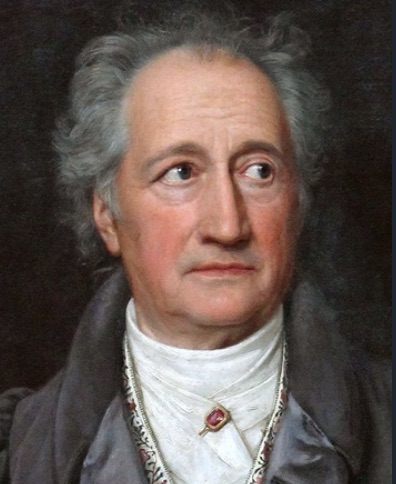
Johann Wolfgang von Goethe was born on August 28, 1749, in Frankfurt, Germany into a well-to-do family. His father was a successful lawyer, and his mother came from a respected Frankfurt family. At an early age, Goethe displayed an interest in literature and in particular, the works of Homer, inspiring him to try his hand at writing poetry. His fascination with puppet shows expanded into an interest in the theater, and by the time he reached adolescence, his interests were broad and all-encompassing.
Between 1765 and 1768, Goethe studied law at Leipzig University but he found the rote memorization of the judicial rules to be tedious and he was drawn to explore poetry under the tutelage of professor Christian Fürchtegott Gellert. During his Leibzig University years, he became involved in Sturm und Drang (“Storm and Stress”), a literary movement that rejected societal norms and embraced individualism and personal expression.
Johann achieved international acclaim when he was 25 years old, with the 1774 publication of his epistolary novel, The Sorrows of Young Werther. The novel’s emotional intensity and exploration of romantic themes made it a sensation across Europe. He continued to write prolifically during this period, developing the drama Egmont, the poetic play Iphigenia in Tauris, Torquato Tasso and several other works that were published in the next decade. In 1775, Goethe moved to Weimar, where he entered the service of Duke Carl August and became a prominent figure in the cultural and political life of the town.
Goethe wasn’t just a literary figure; he also had a deep interest in natural sciences. In 1788 he published his first major scientific work, Metamorphosis of Plants containing some of his explorations of in biology. His work on color theory, in particular, challenged Isaac Newton’s ideas, with special emphasis on the subjective and psychological aspects of color perception.
In his later years, Goethe embarked on various publications, including his autobiographical work Dichtung und Wahrheit (Poetry and Truth). In 1808, he released what would become his most famous work, the epic dramatic poem Faust Part I. During the next two decades, he continued to produce literary works, finishing Faust Part II, just before his death from heart failure on March 22, 1832. This epic work, presenting a complex exploration of human ambition, knowledge, and redemption was published posthumously in that year. According to his physician, Carl Vogel, Goethe’s last words were, “Mehr Licht! (More light!),
Goethe’s literary works reflect a deep exploration of human nature, the struggle between passion and reason, and the relationship between the individual and society. He bridged the Enlightenment and Romantic eras, and his writings have inspired generations of writers, thinkers, and artists. Johann Wolfgang von Goethe’s contributions to literature, science, and philosophy have left an indelible mark on Western culture, and his works continue to be studied and appreciated around the world.
